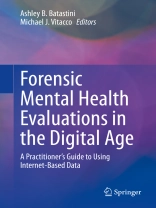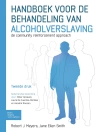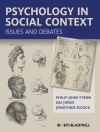This is the first book devoted to the use of social media and other internet-derived data in forming forensic clinical opinions of behavior. Designed for mental health practitioners, it outlines the challenges and the benefits of incorporating digital information in forensic assessments. It offers best practice guidelines geared to both criminal and civil psycho-legal questions. Each chapter includes a brief overview of the psycho-legal issues, clinical applications of consulting internet-based data, ethical and legal considerations and real life, de-identified case examples. This book provides guidance to the clinician in an emerging technological environment in which there are few resources, and ensures a more scientific and legally sound practice.
Inhaltsverzeichnis
Chapter 1: An Introduction to Internet-Based Data and Its Relevance to Forensic Mental Health Assessments.- Chapter 2: Using Social Media in Conducting Evaluations of Criminal Responsibility.- Chapter 3: Using Social Media in Competency to Stand Trial Evaluations.- Chapter 4: Using Social Media in Conducting Risk Assessment.- Chapter 5: The Assessment of Individuals Charged with or Convicted of Sexual Offenses.- Chapter 6: Child Custody Litigation and Psychological Evaluations.- Chapter 7: Integration of Internet-based Data in Pre-Employment and Fitness-For-Duty Psychological Evaluations in the Law Enforcement Arena.- Chapter 8: Personal Injury and Disability Evaluations.- Chapter 9: General Recommendations for Integrating Internet-Based Data in Forensic Mental Health Assessments and What We Still Need to Know.
Über den Autor
Ashley B. Batastini, Ph.D., is an Assistant Professor at the University of Southern Mississippi, where she directs the Correctional and Forensic Psychology Research Laboratory. She also maintains a private practice conducting pre-trial evaluations as a licensed psychologist in the state of Mississippi. Dr. Batastini earned her doctorate in Counseling Psychology at Texas Tech University after completing a pre-doctoral internship at Western State Hospital in Tacoma, Washington. Dr. Batastini has authored or co-authored several peer-reviewed publications and book chapters related to the psychological effects of administrative segregation, community re-entry barriers, violence risk communication, and applications of telepsychology in corrections. Additionally, Dr. Batastini is the lead developer of an evidence-based program for inmates with mental health concerns who are detained in or prone to restrictive housing environments (Stepping Up, Stepping Out).
Michael J. Vitacco, Ph.D., ABPP, is an Associate Professor of Psychiatry and Health Behavior as well as in the Institute of Public and Preventive Health at Augusta University in Augusta, Georgia. At Augusta University he serves as the Director of the postdoctoral fellowship program in forensic psychology. He also maintains a private practice conducting pretrial, preemployment, risk evaluations as a licensed psychologist in the states of Georgia and Wisconsin, He completed his Ph.D. in clinical psychology at the University of North Texas, an internship at the University of North Carolina School of Medicine in conjunction with the United States Department of Justice, and a postdoctoral fellowship in forensic psychology at the University of Massachusetts Medical School. Dr. Vitacco has 15 years of clinical expertise in conducting forensic mental health assessments. Dr. Vitacco is a licensed psychologist and has been board certified in forensic psychology since 2016. Dr. Vitacco is highly published on topics related to forensic mental health treatment and assessment, including violence risk, detection of malingering, and the civil commitment of NRGI patients.












